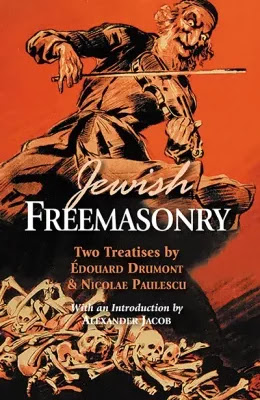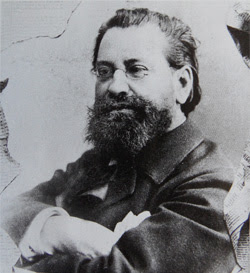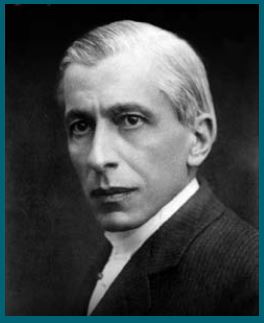COVID's Talmudic Origin
July 24, 2022

Two books provide some of the historical background to the trauma mankind is experiencing.
The agenda of Organized Jewry is based on "the Talmudic dogma of the chosen people, a
doctrine according to which the Jews must not merge with other nations,
because God has promised them to possess the whole earth and to rule
the world."
Paulescu demonstrates the financial and social depredations
wrought by Jewish immigration into European lands and discusses
Freemasonry too within the context of the resolute war that the Jews
have been conducting against Christianity through the ages by means of
the various religious heresies and political revolutions that they have
fostered in Europe."
(Disclaimer - Agenda 2030 ("The Great Reset") is Jewish Supremacism, the agenda of Organized Jewry & Freemasonry (i.e. the Rothschilds.) Most Jews do not subscribe to Jewish supremacism. Many individual Jews like myself, Dr. Naomi Wolfe and Dr. Simone Gold have been on the forefront of exposing the COVID hoax.)
(Abridged by henrymakow.com)
Édouard Drumont: "The Freemasons"
Édouard Drumont (1844-1917) was one of the first to insist that the entire Masonic enterprise was Jewish in origin even though he based his conviction on Masonic texts that had been available in France from the late eighteenth century. [2]
Drumont was a French journalist who wrote many works on the Jews including La France juive: Essai d'histoire contemporain, 2 volumes (1886), Testament d'un antisémite (1891), Les Juifs et l'affaire Dreyfus (1899), La Tyrannie maçonnique (1899), Les Juifs contre la France (1899) and Le Peuple juif (1900). Drumont also ran a newspaper La libre parole, which was markedly anti-Semitic. In 1899 he founded the 'Ligue antisémitique de France' and argued for the exclusion of Jews from society...
The last book of Drumont's Jewish France states that ... The growing influence of Masonry on European politics has resulted in a steady dissolution of traditional European society. Thus Republicanism is, in the nineteenth century, the culmination of the French Revolution with Napoleon and Bismarck contributing to the process of Jewish bourgeois supremacy.
In their enormous and far-sighted political task, the Jewish Masons have been aided through the centuries by ambitious mediocrities from among the European peoples who were the hosts of the Jews during the diaspora.
 (Edouard Drumont, 1844-1917)
(Edouard Drumont, 1844-1917)The second part of Drumont's essay on Freemasonry includes several detailed examples of public figures in French Republican life who have duped the public through various nefarious dealings that have been disguised by the false honors that have been bestowed upon them by the Third Republic. [3]
The entire Republican ethos is indeed marked not by a desire to liberate the oppressed French populace but rather by a hatred of society. In fact, one particularly odious characteristic of Freemasonry is its contempt and hatred for the poor, which is in marked contrast to the importance of charity in the Catholic Church. And if the Masons seem occasionally to tolerate the social status quo, it is only because they wish to focus their mind more sharply on their inveterate religious enemy, the Christian Church:
Thus, many in Masonry are pseudo-scholars, pseudo-orators, they hate society with a hatred that is not at all the courageous revolt of Spartacus, the bitter anger of Vindex, but like a venomous envy that smells of the[4] ante-chamber and the office; they do not intend to destroy the social edifice completely because they hope to make a place there through more or less correct procedures, but they attack the Church because it can give them only noble instructions, counsels of respect and devotion that they do not want.
Nicolae Paulescu: Freemasonry
The Jewish nature of Freemasonry and its hatred of Christianity are reinforced in the work of Nicolae Paulescu (1869-1931). His chapter on Masonry in his work Philosophic Physiology: The Hospital, the Koran, the Talmud, the Kahal and Freemasonry pivots on the same contrast between the Christian concept of charity -- exemplified in Paulescu's own medical profession by 'the hospital' included in the title -- and the sheer avarice for material possession and political domination of the Jews who conduct the Masonic organizations.
Paulescu was a Romanian physiologist and professor of medicine, as well as a political activist. In 1897 Paulescu graduated with a Doctor of Medicine degree from a medical school in Paris. He was appointed assistant surgeon at the Notre-Dame du Perpetuel-Secours Hospital but in 1900 he returned to Romania, where he remained until his death as Head of the Physiology Department of the University of Bucharest Medical School, as well as Professor of Clinical Medicine at the St Vincent de Paul Hospital in Bucharest. He is well-known for his work in extracting insulin for the treatment of diabetes and petitioned the Nobel Prize committee to object to the award given to two Canadian scientists. From Wikipedia:
Professor Ian Murray was particularly active in working to correct "the historical wrong" against Paulescu. Murray was a professor of physiology at the Anderson College of Medicine in Glasgow, Scotland, the head of the department of Metabolic Diseases at a leading Glasgow hospital, vice-president of the British Association of Diabetes, and a founding member of the International Diabetes Federation. In an article for a 1971 issue of the Journal of the History of Medicine and Allied Sciences, Murray wrote:
"Insufficient recognition has been given to Paulesco, the distinguished Roumanian scientist, who at the time when the Toronto team were commencing their research had already succeeded in extracting the antidiabetic hormone of the pancreas and proving its efficacy in reducing the hyperglycaemia in diabetic dogs."
"In a recent private communication Professor Tiselius, head of the Nobel Institute [and a recipient of the Nobel Prize for Chemistry in 1948], has expressed his personal opinion that Paulesco was equally worthy of the award in 1923."
Paulescu was also involved in Romanian political movements and influenced Corneliu Zelea Codreanu, the leader of the Iron Guard. In 1922, he partnered with Codreanu's anti-Semitic friend, Prof. A.C. Cuza, to create a political group called the National Christian Union. In 1925, Paulescu joined Cuza's later organization, the National Christian Defense League as well.
Nicolae Paulescu's sociological writings include Philosophical Physiology: Instincts Social -- Passions and Conflicts -- Moral Remedies (1910), which advocated the regeneration of the population through Christian education. Paulescu's most famous book was the second volume of "philosophical physiology" which was entitled Philosophical Physiology: Hospital, Quran, Talmud, Cahal, Franc-Masonry (1913). He later wrote more works on the Jewish Problem, including Philosophical Physiology: The Synagogue and the Church to the Pacification of Mankind, 2 vols, 1923; The Judeo-Masonic Plot against the Romanian People, 1924; The Degeneration of the Jewish Race, 1928, Jewish Debauchery, 1928; and Interpretation of Revelation, the future fate of the Jews, 1941.
In The Hospital, the Koran, the Talmud, the Kahal and Freemasonry, Paulescu first explains the duties of doctors and relates hospitals to the notion of Christian charity: "Hospitals are an inspiration of Christian charity." He then considers the two other religions that claim to cure the illnesses of mankind, Islam and Judaism, both of which he considers as opposed to Christian morality. Islam and Judaism are both characterized by a cruel desire for possessions and dominion but the Muslim Arabs are superior to the Jews in that they possess a real valor whereas the Jews "manifest themselves only through cowardice."
 Nicolae Paulescu (1869-1931)
Nicolae Paulescu (1869-1931)Paulescu begins his study of Judaism with the principal legal text of the Jews, the Talmud, which uses usury, fraud and perjury to rob and enslave the Gentiles. The development of the Jewish political ambition is accomplished through the "Kahal," the Jewish governing body typical of Jewish communities well into the twentieth century. The Kahal conceives of the Jewish nation as one based on "the Talmudic dogma of the chosen people, a doctrine according to which the Jews must not merge with other nations, because God has promised them to possess the whole earth and to rule the world." He demonstrates the financial and social depredations wrought by Jewish immigration into European lands and discusses Freemasonry too within the context of the resolute war that the Jews have been conducting against Christianity through the ages by means of the various religious heresies and political revolutions that they have fostered in Europe.
Paulescu's section on Freemasonry, which constitutes the final chapter of his book, relies considerably on Drumont's work but it is rather more comprehensive than it. Paulescu here reveals the hatred that informs all of the Jewish involvement in European intellectual and political history.
The source of this hatred is evident most clearly in the Talmud but its enduring effects are manifest in the various Jewish-sponsored heretical movements that have sought to distort Christianity and Catholicism through the ages, beginning with the Ebionites in the first century A.D. and passing through Protestantism to Freemasonry.
The purported goal of the Freemasons to rebuild the Temple of Solomon is, according to Paulescu, only a watchword that indicates the ambition of Israel to dominate the world. Regarding the organization of Freemasonry, Paulescu points out that, in spite of its proclaimed philanthropy, the secretive nature of the whole is a clear indication of its suspect character: "And to think that no one wonders why this society is hidden, when it has purposes as sublime as the search for the truth."
More carefully than Drumont, Paulescu -- relying on the work of Paul Copin-Albancell's Le drame maçonnique: le pouvoir occulte contre la France ("The Masonic Drama: The Occult Power against France" ( 1908) -- details the hierarchy within the Masonic organization where the lower degrees of Masons are mostly blindfolded followers of an uppermost elite that is constituted of Jews alone.
And the bizarre rituals that mark a Mason's progress through the organization are all marked by sentiments of hatred and revenge for those responsible for the destruction of the Temple. Among the various targets of the Masons' hatred, the chief are undoubtedly the Christians.
Quoting Copin-Albancelli, Paulescu points out that Masons are instructed to the effect that "Freemasonry has one enemy - Christianity, and Catholicism in particular -- that you need to hate and fight."[5] ...
The real aims of all Masonic republics were to destroy monarchies, abolish Christianity from the education of the public, and to convert the people into a proletariat that could easily be made to serve the ambitions of Judah. Based on Bernard Lazare's work L'Antisémitisme, son histoire et ses causes (Anti-Semitism: Its History and Its Causes) (1894), the religious subversion of the Masons is related by Paulescu also to the Kulturkampf that Bismarck conducted against the Roman Catholic Church between 1872 and 1878 and to the Jules Ferry laws of 1882 that mandated secular education in France.
At the same time, Paulescu claims that "Jewish Socialism" works towards the dispossession of private property by a state that is essentially Jewish in its composition and interests. These false socialist movements were crystallized in the doctrines of the Jew Karl Marx. And they were bolstered in their subversive agenda by the Anarchists, who constituted the more murderous and iconoclastic elements of the several revolutions that sprang up in Europe from 1848 onwards....
By positing a world constituted of matter and energy alone the Masonic-Marxist revolutions succeeded in repudiating the notions of the soul and of God on which Christian civilization had been based.
As Drumont had already pointed out, whereas Christianity stresses love and charity, Masonry has a distinctive contempt for, and hatred of, poverty. Thus, Paulescu is arguing that by steadily obliterating the Christian doctrines of compassion and charity and enlarging the worldly possessions and power of the Jews, Masonry has finally accomplished in post-Revolutionary Europe what the Talmud has striven to achieve from the very first centuries of the Christian era.
---
Related - Rabbi admits Jewish goal is world domination
---------- Ed Decker A Question of Freemasonry
---------- Juri Lina - Freemasonry - Mankind's Deathwish
---------- Ed Decker A Question of Freemasonry
---------- Juri Lina - Freemasonry - Mankind's Deathwish







RG said (July 24, 2022):
Excellent article Henry.
I sat having coffee with a group of older ladies at a local church some months ago whereby the subject of Freemasonry came up. I commented that Freemasonry was Jewish to which they all expressed their utter contempt at my comment, got up and walked away.
Their thoughts are above knowledge, their brainwashing clearly thorough.
Having worked in local government and experienced considerable persecution, I came to discover the management consisted of Masons whose goal was to steal as much from the other employees for themselves as possible.
Living in a multicultural society I can see likewise how the Muslims place material gain above morality whereby lying, cheating and contempt of their hosts is part of their culture. They are now occupying some of the best parts of the city.
Don’t get me wrong, with large families they have a free workforce and obtain their superiority in materialism through hard work.
Sadly I now see the same mentality creeping into my own countrymen and Christian brethren: Lying, stealing, cheating, disloyalty becoming common amongst my own people.
Prosperity is fine and good if done so morally. Sadly so many of us have become lazy and unwilling to work hard any more, everything coming so easily to us in the west. It is pathetic that so many in my society consider their entire life to be paid for by the state – from cradle to grave.
I have given up large portions of my life to serve others freely, without financial reward, perhaps I was a fool to do so but there are no pockets in a shroud. They can’t take the cash and goods with them but for sure they will take their sins, their wickedness and evil deeds to the next life to be judged for eternity and eternal punishment and suffering will be their reward.
Shiloh